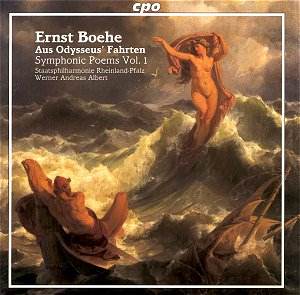It came as no surprise to learn that Ernst Boehe was
a personal friend of Richard Strauss, because if there is one composer
whose influence is to be heard here, it is his fellow Bavarian. It does
come as a surprise, however, to find no mention of Boehe in Grove 6
or, more surprisingly, the German music dictionary MGG. Boehe’s career
was that of a conductor, not at the highest levels by any means even
within his own country, but in places like Oldenburg or the Saarland
Palatinate. His music is lushly tuneful, densely orchestrated (he always
seemed to write for large orchestral forces) and harmonically ‘safe’
considering the Second Viennese School was exactly contemporaneous and
very active. Strauss was producing Salome at the time Boehe was
writing his tone poem Odysseus.
Without a second disc we are at a disadvantage, despite
CPO’s reassurance that Boehe designed them as independent episodes.
Odysseus is a four-movement structure, like a symphony, and for
reasons of length the fourth movement awaits on a later disc, but having
listened to all three, one needs the concluding finale (apparently cyclical),
which presumably depicts Odysseus’ return to his homeland of Ithaca
to deal with Penelope’s suitors and be reunited with his son Telemachus.
Max Bruch dealt with this subject back in 1872 but as a secular oratorio,
and a marvellous work it is too, and of course Brahms wrote a Tragic
Overture, so Boehe is clearly at a certain disadvantage. His Tragic
Overture is nothing inspiring and one suspects purely a filler (or starter
in this case) but Odysseus is altogether on another level. True
it does meander in places, and one does have to refer to a synopsis
to see which part of the saga is being described (even within movements
there are episodes) but familiarity with the recurring motifs helps.
The seductive flute, harp, solo violin and lightly orchestrated accompaniment
(after a passage for solo bass clarinet) is a colourfully intense portrayal
of Circe’s seductive but ultimately fruitless attempt on the virtuous
Odysseus. The sea is evoked in the highly Wagnerian start to the third
episode before Nausicaa’s flute lament, echoed by the cor anglais, and
later taken up by a beautiful violin solo, which builds to a glorious
orchestral climax.
The recording is in the safe hands of conductor Werner
Andreas Albert, the orchestra (descended from Boehe’s own of the 1920s)
generally coping well with the music’s sometimes considerable demands.
One doesn’t see Boehe making it to concert hall programmes in the way
his music was supposed to have done many years ago, for ‘his later works
experienced hundreds of performances in Europe and America’ reads this
unlikely claim by a contemporary observer. A splendid discovery, but
I really wish CPO had invested in a two-CD complete package. Let us
hope that the finale is not long in coming.
Christopher Fifield
